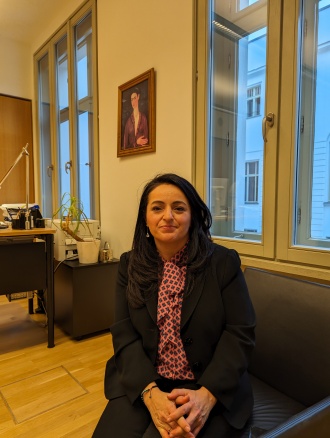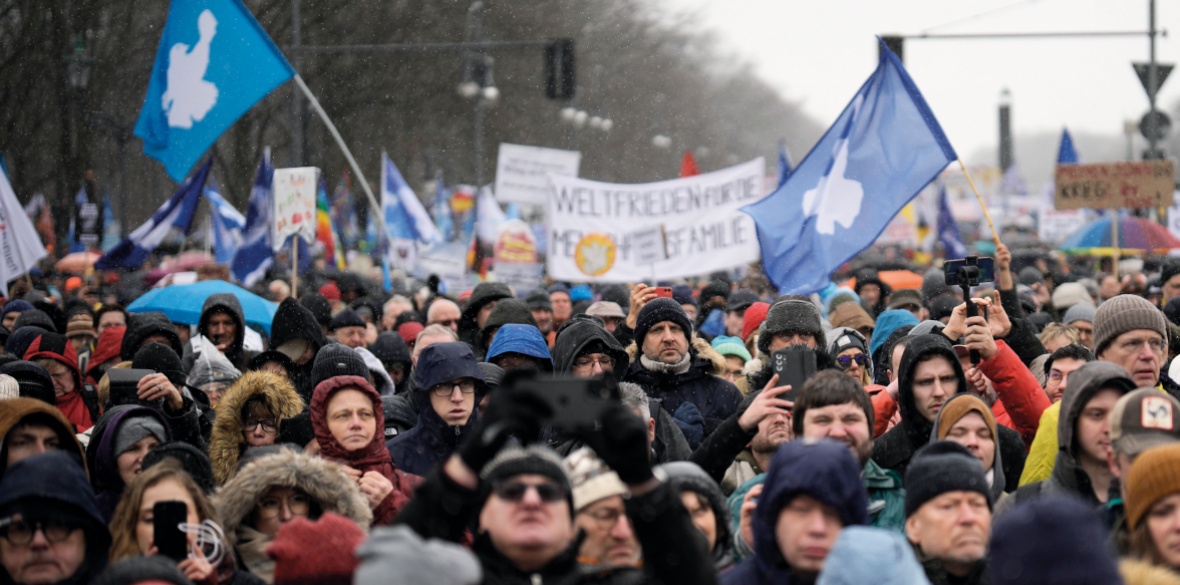This is the last article you can read this month
You can read more article this month
You can read more articles this month
Sorry your limit is up for this month
Reset on:
Please help support the Morning Star by subscribing here
THIS weekend the founding convention of the Sahra Wagenknecht Alliance for Reason and Justice (Bundnis Sahra Wagenknecht, or BSW) will put Germany’s newest political formation firmly on the map.
For a brand new party formed of 10 MPs who have quit the Left party (Die Linke), primarily over its increasingly pro-war stance, it’s doing well: one voting intentions poll this week put it on 14 per cent, equal to the Social Democrats of German Chancellor Olaf Scholz, ahead of his coalition partners the Greens (on 12) and the Free Democrats (on 4), and with more than three times the support of the party they have just left, which trailed on 3 per cent.

Sevim Dagdelen — one of the MPs founding BSW, who wrote about the reasons to do so last October in the Morning Star — says enthusiasm for a new party is running high.
“Between October 23 [when its formation was announced] and January 8 we raised €2.4 million (£2.3m) in donations, and that’s mostly in small amounts — five, 10 or 20 euros except the one donation of €1 million of an old couple in east Germany,” she tells me in her Bundestag office.
“They know we need money to launch a party, to fight electoral campaigns, and they want to give us a chance. A lot of people are interested. They do have hope.”
Its convention will host 450 delegates elected from all over Germany, plus 100 guests and about 100 journalists. It needs to adopt the party’s founding statutes, elect an executive and set out a programme for the coming European elections — all within one day, since Dagdelen says frankly the party cannot afford to hold a multi-day convention yet.
BSW’s main dividing line from Die Linke has been on peace — Wagenknecht’s outspoken opposition to Nato’s approach to the Ukraine war, which included pointing out that EU sanctions on Russia have done far more damage to Germany than to Russia itself, saw her smeared by colleagues as a Putin apologist. The success of her manifesto for peace, launched with German feminist Alice Schwarzer and attracting hundreds of thousands of signatures, only enraged them more.
Is a pro-peace policy the reason so many people are interested in the BSW?
“It plays an essential role. People are fed up with the government’s foreign policy. And on foreign policy you don’t have an real opposition — we are the only political group which is against this toxic mix of weapons delivery, sanctions and armament, so they are fed up with the policies of the other parties as well.”
Though the far-right Alternative for Germany has posed as a peace party, Dagdelen rejects that. “They are for drone wars and oppose a ceasefire in Gaza. They are in favour of military interventions abroad. They are in favour of Nato membership, and even the requirement to spend 2 per cent of GDP on the military. The foreign policy of the AfD and the other parties is actually almost the same.”
The German government has banned Palestine solidarity demos and brandished its pro-Israel credentials, but Dagdelen says this doesn’t reflect German opinion, citing a recent poll from public broadcaster ZDF that showed 61 per cent believe Israel’s military operation in Gaza is “not justified,” compared to just 25 per cent who responded that it was.
“Absolutely contrary to the government’s line, which is to support the war of Israel, even with weapons deliveries. And I know these include weapons capable of killing civilians, like ammunition for machine guns, because I put a question to the government about it.”
She’s scathing too about Berlin’s intervention in favour of Israel at the International Court of Justice, where it is battling South Africa’s charge of genocide: “Given our history, we should be very, very careful about intervening on this.”
Dagdelen stresses that the BSW is “the only party in the German parliament calling for a ceasefire in Gaza. The only one wanting to stop the weapons supply to Israel,” points she believes underline how essential its formation is.
But while in Britain the Gaza war has mobilised a mass movement for peace, in Germany it was there before, with mass rallies in Berlin opposing the delivery of weapons to Ukraine and sanctions on Russia.
“People understand that the sanctions are the root cause of high energy prices. That the additional military spending is linked to the cuts to social spending.”
Peace activists in Germany have worked to highlight that link, with speakers at the recent Rosa Luxemburg Conference describing the €100 Billion for Youth campaign, which held rallies and circulated material outlining what additional funds could be allocated to education, healthcare and other social spending if the government reduced its military budget.
The case has become even stronger since the Constitutional Court ruled last November that the Scholz government’s allocation of €60bn in unspent Covid emergency funds for current spending was illegal, creating a €60bn hole in last year’s budget and meaning Germany has no agreed budget for 2024.
The “traffic light” coalition of Social Democrats, Greens and Free Democrats has scrambled to cut spending in almost all sectors (the military remains an exception) since. Cuts to tax exemptions and agricultural subsidies have provoked a mass farmers’ protest movement: the roads of Berlin were blocked last week by lines of tractors, and farmers’ banners and placards blamed their plight squarely on the coalition: “The traffic light is ruining our future,” many read.
The farmers’ protests were described by the BBC as a recruiting ground for the AfD, but Dagdelen is unimpressed. “The government is in trouble because they have no budget plan, just cuts covering farmers, education and infrastucture but budgeting the military with more than €90 billion for 2024.
“Their policies have proved disastrous for the economy, the only one in Europe which is contracting. You see huge solidarity with the farmers from other workers. Everyone can see energy prices are rising, inputs are rising, food prices are rising, and these protests are huge.
“The government has already announced concessions. The farmers say it is not enough.
“I think it’s scandalous that whenever anyone protests against government policy, the mass media tries to portray them as rightwingers. If you had a problem with any of the Covid measures — you must be a nazi. You oppose weapons deliveries to Ukraine? You must be a nazi.
“It’s counterproductive because once you start calling everyone a nazi then people stop listening. People see it is just an attempt to delegitimise any form of protest. You have this massive cancel culture in Germany, and unfortunately many journalists have just become an echo chamber of the government.”
The AfD only end up benefiting from this Establishment approach — “it pushes people into their arms.” But Dagdelen is also critical of a left which paints the AfD as the only right-wing threat.
“If you’re in favour of armaments to boost massacres and military interventions, you’re on the right. If you’re in favour of war, you’re on the right. If you support cuts to social spending — you’re on the right.
“That’s a description of the policies of the current government. So to focus exclusively on the AfD is the wrong approach from my perspective. Being on the left means you are against social cuts, for social security, for social justice. Against war, for diplomacy and peace: that is what being on the ‘left’ should mean.”
The polls suggest it is working: though Die Linke’s leadership seems blind to the scale of the problem the BSW poses it. “They’re in a bubble. Everyone is to blame for ever worse election results — except them.” But while traditional parties of the left have largely ignored BSW, it has begun to face serious attacks from the right — both the Christian Democrats and the AfD.
“They see the polls, and they’re worried.” Surveys suggest Wagenknecht’s alliance is attracting voters who previously backed the AfD as well as those who backed Die Linke: something essential if the far right is to be defeated, of course, but which naturally prompts accusations that it is flirting with the far right.
Dagdelen says the party’s immigration line is often misrepresented. “We are for the right to asylum and for giving refuge to people who face political persecution.”
Since 2015, when Germany welcomed over a million Syrians, immigration that is much higher than in comparable European countries has combined with spending cuts and (since sanctions on Russia began to bite through rocketing energy costs) a tanking economy to feed resentment, she argues.
“The local authorities say they can’t afford it and they just can’t. And people are struggling for housing, for kindergarten places, so people are becoming less and less welcoming, and that is dangerous for democracy.”
The BSW, by contrast, is doing democracy a favour, she contends. “It’s a service for democracy to have a choice, and not to see that all parties have the same policy.
“It’s clear in your country as well as here that a lot of people are not represented in the political system. The BSW is being launched to do something about that, and I wish more journalists — the BBC for instance — would come and talk to us about why, instead of just writing about us without doing so.”

 Ben Chacko
Ben Chacko








